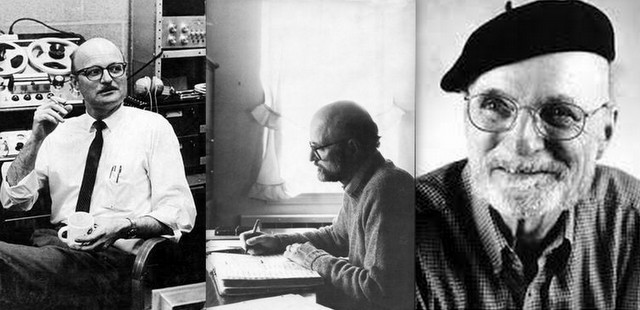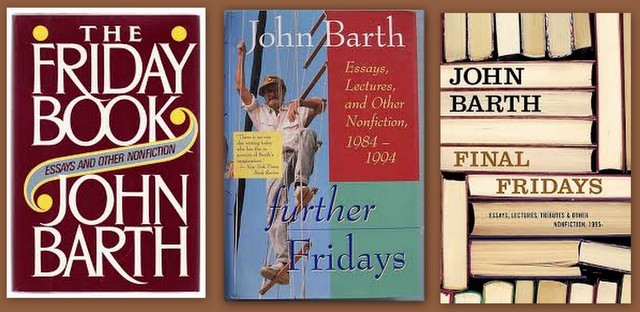In his continuing series of chance encounter essays, Robert Day reminisces about his years long friendship with John Barth, their regular Friday lunches and the jokes they told each other. Barth once described Day in an essay as “a writer-friend from Kansas who knows about water-wells informs me of the important distinction between dry wells and gurglers.” These meetings eventuated into a trio of books by Barth: The Friday Book, Further Fridays, and Final Fridays. As always, Robert Day is an amiable and witty raconteur, slyly self-deprecating, and obviously a loyal and valuable friend. You just wish you’d been there, all those Fridays.
dg
—
We met by chance in the late 1970’s when Jack and I tried to convince one another that I should be the Director of the Johns Hopkins Graduate Creative Writing Program. I was then teaching at Washington College, in Chestertown, where it turned out I stayed. But from those first days when I toured the Hopkins Writing Seminars, meeting the faculty and students, Jack and I became friends because of — as Montaigne writes — who he is and who I am.
Not long after our pas de deux at Hopkins, Jack called to say he would be coming to Chestertown (where he and Shelly had recently bought a house) the following Friday and would I join him for lunch? Agreed. It was to be the beginning of scores of Friday lunches, continuing to this day.
Where we met that first time I do not remember, but I do remember that our talk was rangy, ebullient, and exclusively literary. Well, not exclusively literary because from the first we’d swap jokes — Jack beginning with a series of hillbilly pig jokes when he learned I had studied a stint at the University of Arkansas, and I, in trade, ranch jokes imported from West Jesus Land, Kansas, where I live part time. The second thing I remember is that someone must have spotted Jack (a new book of his was just out with his photograph appearing in the papers) and took our picture.
Avid readers of John Barth will know that those Friday lunches were because of, or resulted in (or some formulation thereof) his three collections of essays. The Friday Book, Further Fridays, and Final Fridays — the latter volume including a piece published in Granta titled: “The End? On Writing No Further Fiction, Probably.” Toward the conclusion of that essay I am mentioned as an anonymous co-conspirator to his muse: More on this later.
Thus our literary lunch Fridays commenced and continued. Not every Friday, but many over the years until Jack stopped teaching at Hopkins and was more often in Chestertown, in which case our Fridays turned themselves into Wednesdays or Mondays—or encore, a real Friday itself.
In the beginning, one of us would pay the lunch tab then the next time the other way around, even though sometimes we’d get confused. At one lunch I said I thought it was my turn but Jack said no, it was his, and he insisted. To which I said, I’m not sure we’re even, to which Jack replied: Friends are never even. And about that time, once again, someone took our picture.
“What do you think the caption will be?” I had asked Jack. “You first,” he said. “Nationally famous author lunching with unidentified man,” I said. “I’ll pass,” he said, but in the moment of silence between us, I thought that his fertile and fervent literary imagination could have made an entire novel out of my minimalist caption. And maybe yet it shall.
What my friend has accomplished with his fervent imagination is the creation of a world of fiction unlike any other American writer. And the landscape of that fictive world is immense: From the early realistic and nihilistic novels, The Floating Opera and The End of the Road, to the faux historical novels, The Sot Weed Factor and Giles Goat Boy, and then changing course to On With the Story, Letters, The Tidewater Tales, Lost in the Fun House, The Last Voyage of Somebody the Sailor, and back to On with the Story, Coming Soon, The Development, and his most recent book: Every Third Thought, A Novel in Five Seasons.
Jack’s writing is not so much a landscape of fiction as an Ocean of Story. But writers are not unique just because of the breadth of their oeuvre. There has to be something else. An editor we shared at the Washington Post Magazine called that “something else” The Pyrotechnics of Prose.
It is as if my friend’s muse is a character in his fiction, at least the muse that is his gift of language. Surely some critic has noticed the jazz improvisations in Jack’s writing: I have. Those are what we who write call invention. It comes from where we’ve been coming from in the paragraphs before. And the chapters before that. And it comes from where we’ve come from as readers: In Jack’s case, back to Lawrence Stern in English and further back than that in ancient languages and oft told old tales told on a thousand and one nights. All of these he spins into tales of his own, with his own voice and muse doing the spinning. Like Joyce and Nabokov and Garcia Marquez and Italo Calvino, he conjures a maelstrom into his own Ocean of Story. He is Tradition and Individual Talent. And fireworks at sea. About his extraordinary achievement in American letters and my modest one, we never talk. Friends are, in many ways, never even.
By design we had lunch again the other day, a Wednesday as Zeus would have it. Before we met I read the Granta essay in which Jack muses that his muse is not musing these days. In it he writes, “A writer-friend from Kansas who knows about water-wells informs me of the important distinction between dry wells and gurglers which may cease producing for a time but eventually resume; he encourages me to believe I’m still a Gurgler.”
There is a custom among writers that we do not ask each other about work-in-progress. It is like telling an actor “good luck” before the curtain goes up, thus the tradition of “break a leg.” Are gurgling or non-gurgling muses covered by our custom?
Lunch was at Evergrain in Chestertown. We took an outside table to enjoy the sunshine. After all these years we tell many of the same jokes, but sometimes I tell one Jack has told me and take credit for it, and Jack does the same. He doesn’t recall his early hillbilly pig jokes and I need to be reminded of my Kansas parrot joke. In this way at least we are even. Then we talk about Philip Roth and how he has recently resigned from writing fiction — as opposed to—? But neither of us mention it. About this time, someone takes our picture.
Between that first photograph and this one I have taught thousands of students at Washington College, and those students are sending their children, and in some cases, their grandchildren to Washington College. Mothers and fathers and a few grandmothers and grandfathers were now coming back for Parents’ Weekends and Graduations. And having lunch out. Some stopping to reintroduce themselves.
“What’s the caption?” I ask Jack.
“Locally famous professor having lunch with unidentified man,” he says. To which in the small silence between us I think: Lucky me to have had a duel oeuvre of Friday lunches with my friend talking books and telling jokes. And lucky all who are avid readers of muse-inspired American literature to have had John Barth with his firecracker prose going off like St Elmo’s fire in his Oceans of stories.
As we walk down the street to our cars, I ask Jack if he is the one who told me the aphorism that as we get older, Sex goes, memory goes, but the memory of sex—that never goes.
“I think you told me,” he says.
“Let’s both take credit for it,” I say.
“Co-authors?”
“We’d be even for once if you don’t mind.”
“My pleasure,” he says. In this he speaks for me.
—Robert Day
—————————-
Robert Day‘s most recent book is Where I Am Now, a collection of short fiction published by the University of Missouri-Kansas City BookMark Press. Booklist wrote: “Day’s smart and lovely writing effortlessly animates his characters, hinting at their secrets and coyly dangling a glimpse of rich and story-filled lives in front of his readers.” And Publisher’s Weekly observed: “Day’s prose feels fresh and compelling making for warmly appealing stories.”


“. . .an ocean of story.” Doesn’t this sound like an invitation? Classical Day, to nod to Barth’s beautiful work and simultaneously throw the door open for writers. If it is an ocean, which is infinite, then there is room for more. I am grateful for this reminder to go read more Barth, and always encouraged by Day’s humanness in the writing. How the jokes and the books and the Fridays and the photographs are each as important as the other. How these details make narrative sing. How this makes life sing.
Delightful reminiscence.